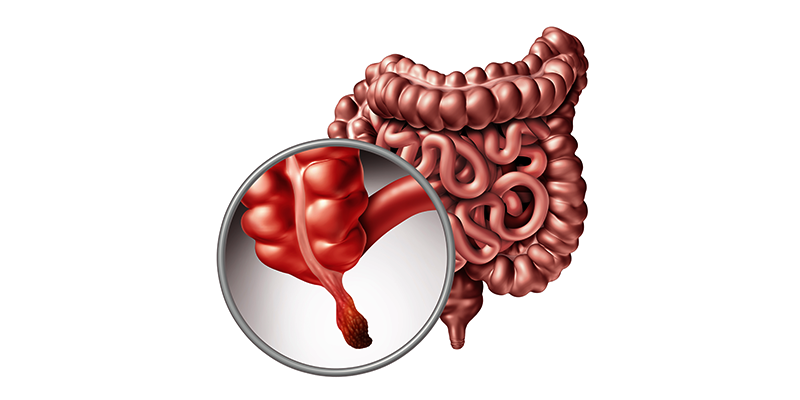WHAT CAUSES APPENDICITIS?
2021-01-30 / RG STONE HOSPITAL / Appendicitis

What is Appendicitis?
Appendicitis is a painful situation when the appendix gets inflamed due to the pus that gets filled inside it. The pain usually starts with cramps in the upper abdomen region and can become chronic to life-threatening. At times, the patient also experiences pain the lower part of the abdomen region. An appendix is a 4-inch long pouch of storage for the good bacteria that helps the body fight infection, but it is still unclear what exact function the appendix performs. Appendicitis is one of the most unpleasant situations as the bacteria spill up inside the tube, causing the appendix to get filled with bacterial pus and turn red and swelled. Small pieces of faeces often get hardened in the small intestine and can often drive appendicitis development.
Symptoms of Appendicitis
Although pain is not the most common symptom, several other symptoms are frequently experienced by appendicitis patients. When a patient’s appendix gets swelled, he/she is expected to experience some of the following symptoms.
1) Nausea
2) Vomiting
3) Mild to chronic pain in the lower right abdomen region
4) Pain around the naval area
5) Mild fever
6) Digestion problems
7) Gastric issues and difficulty in passing out the gas
8) Diarrhea
9) Difficulty in passing stool
The patient at times also experience difficulty in breathing, coughing, irritability and fussiness. If you experience any of the symptoms mentioned above, then you should visit RG Stone Hospital’s nearest branch and consult our expert gastroenterologist immediately for an expert feedback.
Causes of Appendicitis
In general, it is an inflammation of the appendix that causes intense pain or fever. In children, appendicitis may lead to severe pneumonia. Symptoms include vomiting, pain in the upper abdominal area, fever, and general discomfort. If a virus causes the infection, the symptoms get even worse-not only by the pain but also by the fever's duration. The medical community believes that fungal agents most often cause appendicitis. These fungal agents are generally known as C. Botulinum, C. Difficile, or C. tularensis. An infection occurs when your body sends white blood cells to attack the fungus instead of the invading viruses. When the white blood cells contact the fungi, they attack them and ultimately result in serious illness.
What causes appendicitis in new-borns?
A burst appendix is one of the most common reasons for the appendicitis conditions in children. Usually, it happens because a baby is born prematurely, because of which, the baby& appendix Never forms properly. The result is that the appendix may rupture, causing intense inflammation and pain.
What are the possible complications of appendicitis?
Most cases are mild and do not threaten health. However, some rare cases may lead to more complicated health problems. Two infrequent but possible complications are infection and death. A burst cyst or perforation can cause an infection. Suppose you have a history of
sexually transmitted diseases. In that case, you are at risk for developing an infection if you’ve had performed sexual intercourse with a person who had an active infection. If you have a perforation, the bacteria could enter into your bloodstream, potentially causing sepsis, a life- threatening blood infection. Since the ruptured appendix is an entry site for bacteria, you may have a bacteria or virus that became trapped in your large intestine, leading to this condition. Diabetes, HIV, obesity, prolonged bed rest, and drug use are common causes of this disease.
Diet & Remedies of Appendicitis
Eating fruits and vegetables can reduce inflammation and prevent the appendicitis problem. Eating oats, brown rice, lentils, legumes, beans and whole-grain foods are some of the items you should include in your daily diet. Your body should get a lot of rest, and stretching exercises along with walking or jogging are advised to keep Appendicitis away. These are some of the remedies that you should follow along with your medications and prescriptions and shouldn’t only rely on them.
Treatments for Appendicitis
In most of the cases, the treatment of appendicitis requires surgery of appendix. Minimally invasive surgery is performed through laparoscopy to remove the inflamed appendix. Medications are given along with performing the pus-filled drainage inside the appendix if the abscess has not been ruptured.
Conclusion
It is advised and essential to consult a gastroenterologist who will correctly guide you to take what medications and surgery options that accelerates your process of treatment for appendicitis. RG Stone Hospital is the leader in the field of gastroenterology and is well equipped with machines of the latest technology, quality treatments and expertise that has the excellence of 34 years and withholds the Guinness World Record of treating the largest kidney stone of size 13cms. So, for all your gastroenterological, urological and nephrological needs, RG Stone, takes care of your health, just like your family.
Categories
Hernia Repair
Appendicitis
Piles
Urological Treatment
Hernia treatment
Enlarged Prostate (BPH)
Gall Bladder Stone
Urinary / Kidney Stone
Vitamins
Indian Health Care System
Exercise
Obesity
Female Urinary Incontinence
Single Incision Laparoscopic Surgery (SILS)
Kidney Cancer
Bladder Cancer
Ovarian cancer
Nephrology
Bariatric Surgery
Kidney Function Test
Female Urology
Radiation Therapy
Alcoholic Fatty Liver
Liver disease
Gastroenterology
Kidney Disease
Nutrition & Health

